This blog post will show you how to use Python to scrape Google News, allowing you to automate the collection of headlines, article snippets, and other relevant data with ease. Whether you’re building a personal news aggregator or just want to monitor news programmatically via an API, this guide will help you get started.

Google provides news on two different places:
1. Google search - news tab
2. news.google.com website
They have different layouts and provide different results. We'll learn how to scrape both of these results.
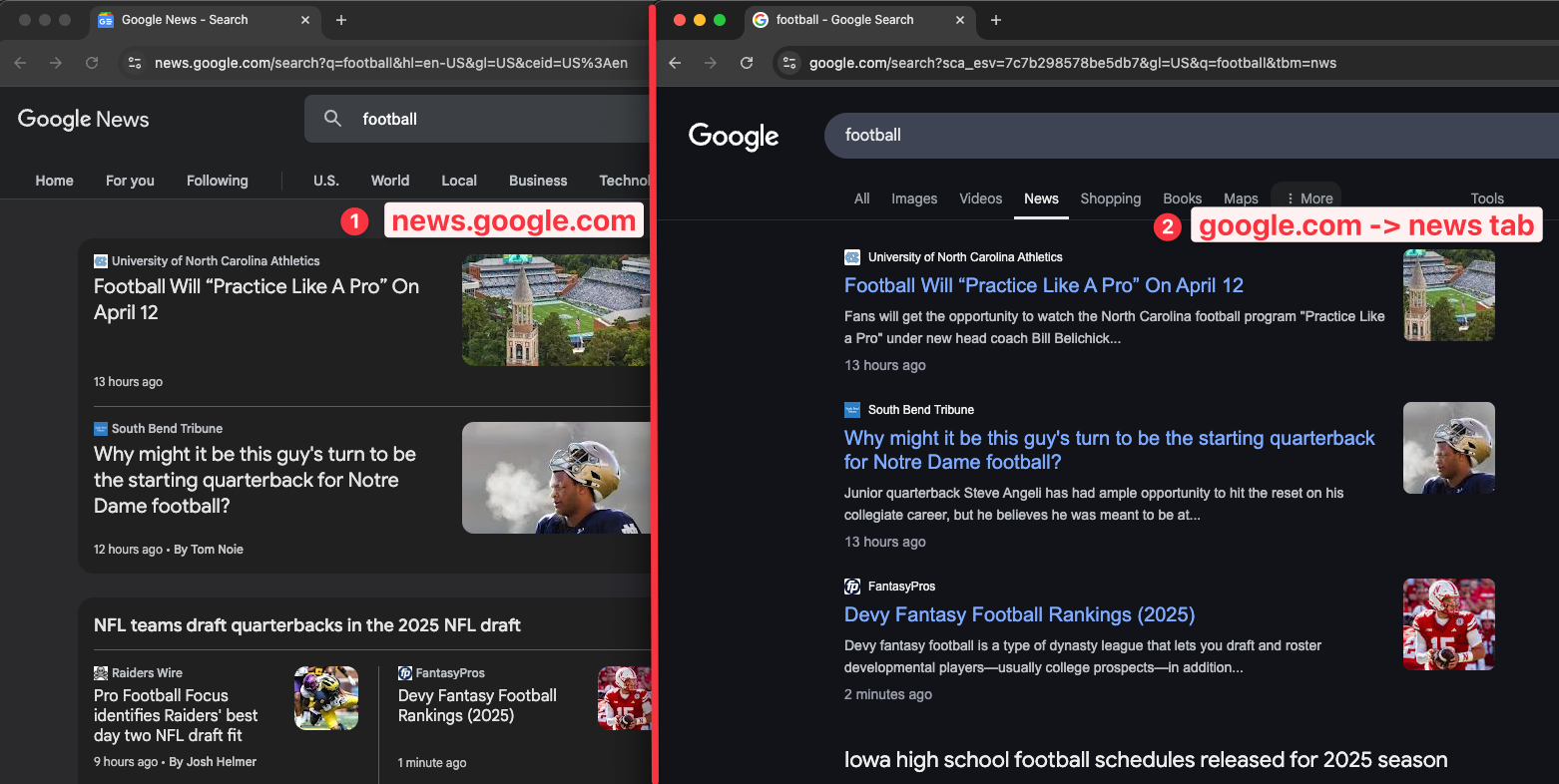
Code preparation
You can use a simple GET request or a dedicated SDK based on your programming language, including Python, Javascript, and more. In this post, we'll use the GET request method in Python.
Preparation for accessing SerpApi API
- Register at serpapi.com for free to get your SerpApi Api Key.
- Create a new
main.pyfile - Install requests with
pip install requestsHere is what the basic setup looks like
import requests
SERPAPI_API_KEY = "YOUR_REAL_SERPAPI_API_KEY"
params = {
"api_key": SERPAPI_API_KEY, #replace with your real API Key
# soon
}
search = requests.get("https://serpapi.com/search", params=params)
response = search.json()
print(response)With these few lines of code, we can access all of the search engines available at SerpApi, including Google Lens. We'll need to adjust the parameters based on our needs.
Scrape the news tab from Google search
First, let's see how to scrape the news tab from Google search results. We'll use the Google search API from SerpApi.
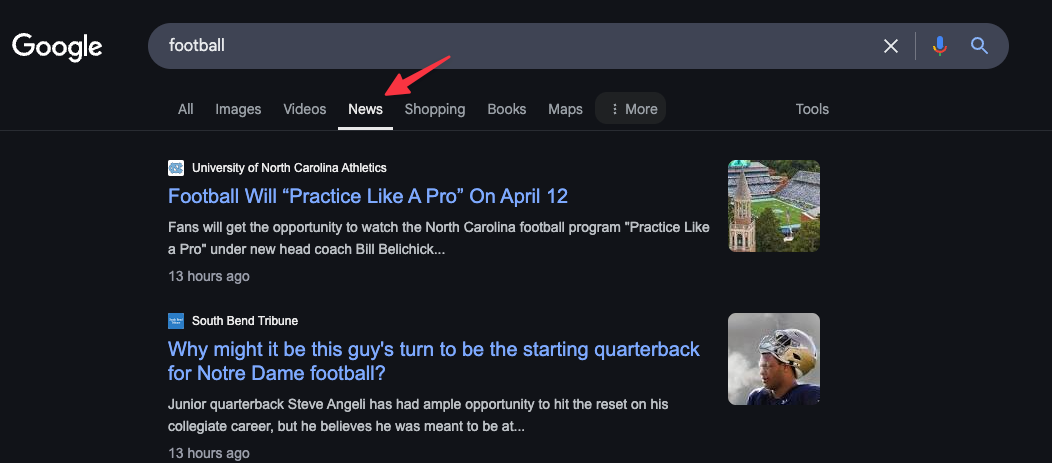
If you prefer to watch a video, here is the video tutorial on YouTube
Here is the complete script to scrape this page
import requests
SERPAPI_API_KEY = "YOUR_API_KEY" #replace with your real API Key
params = {
"api_key": SERPAPI_API_KEY,
"engine": "google",
"tbm": "nws",
"q": "football",
}
search = requests.get("https://serpapi.com/search", params=params)
response = search.json()
print(response)Feel free to replace the q value, with any query you want to search for.
Try to run the code with python yourfilename.py , you should see the JSON response from our API.
We can also print the result in a more readable way by using the json function
import json
# ... previous code ...
response = search.json()
print(json.dumps(response, indent=2))
Now, we can see the results, including the news_results nicely. It'll include the link, title, source, date, snippet, and the thumbnail of the news.
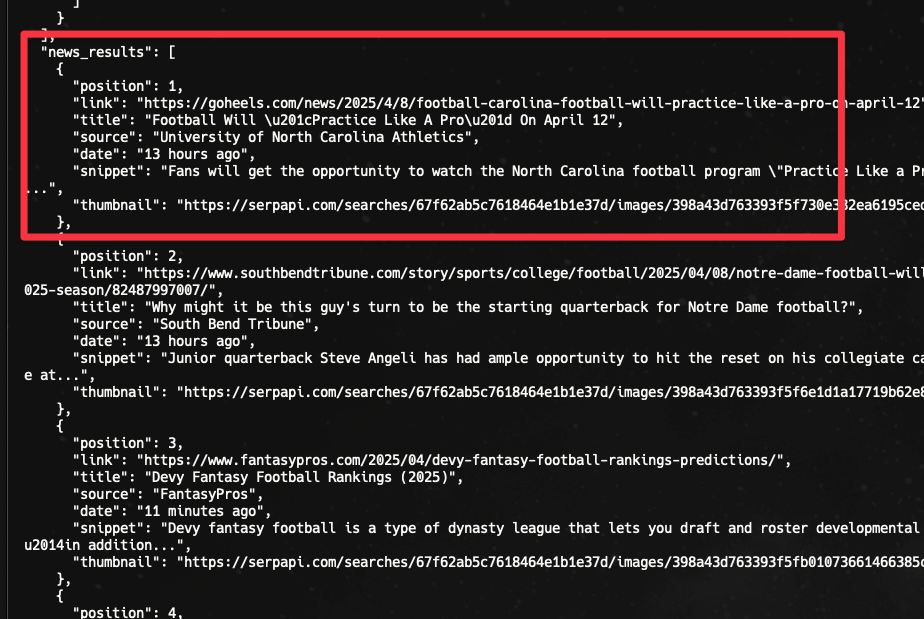
Filter news results by time
Google allows us to filter the results, including news results by time. We need to use the tbs parameter for this.
- Past hour - tbs=qdr:h
- Past 24 hours - tbs=qdr:d
- Past week - tbs=qdr:w
- Past month - tbs=qdr:m
- Past year - tbs=qdr:y
- Custom range - tbs=cdr:1,cd_min:x/x/x,cd_max:y/y/y, where x/x/x is start date and y/y/y is end date.
Learn more about filtering Google results in this blog post.
Example usage to filter news from the past week:
params = {
"api_key": SERPAPI_API_KEY,
"engine": "google",
"tbm": "nws",
"q": "football",
"tbs": "qdr:w", # time filter example
}
search = requests.get("https://serpapi.com/search", params=params)
response = search.json()
print(json.dumps(response, indent=2))
Filter news by a specific website
We can filter the search results by a specific website using keyword site:websitename.com on the query, which is the q parameter.
Example:
params = {
"api_key": SERPAPI_API_KEY,
"engine": "google",
"tbm": "nws",
"q": "football site:time.com",
}
search = requests.get("https://serpapi.com/search", params=params)
response = search.json()
print(json.dumps(response, indent=2))Now, we're only returning results from time.com website related to the keyword.
Scrape all news results (pagination)
So far, we have only scraped the first page results. First, we can adjust the number of results we scrape per page using the num parameter. By default, Google returns a maximum of 10 news per page. We can add more by setting it to num=100.
params = {
"api_key": SERPAPI_API_KEY,
"engine": "google",
"tbm": "nws",
"q": "soccer",
"num": 100
}Again, we're still only scraping the first page. In order to paginate the result, we can loop the program and use the start parameter that increased by 100 as well.
params = {
"api_key": SERPAPI_API_KEY,
"engine": "google",
"tbm": "nws",
"q": "soccer",
"num": 100
}
# Pagination
news_results = []
start = 0
while True:
params["start"] = start
search = requests.get("https://serpapi.com/search", params=params)
response = search.json()
# Stop the loop when no more news_results available
if "news_results" not in response or not response["news_results"]:
break
news_results.extend(response["news_results"])
start += 100
response = {
"news_results": news_results,
}
print(json.dumps(response, indent=2))- We loop the request until no more
news_resultsavailable. - We adjust the start parameter by increasing it by 100.
- In this example, we only collect and print the
news_results.
Export news to a CSV file
Let's learn how to export the news results into a CSV file. We'll store the title, snippet, source, data, and thumbnail in the file, which we can later open in Google Sheets or Microsoft Excel.
You can add these lines to the previous code
import csv
with open('news-results.csv', mode='w', newline='', encoding='utf-8') as file:
writer = csv.writer(file)
writer.writerow(["position", "link", "title", "source", "date", "snippet", "thumbnail"])
for result in response["news_results"]:
writer.writerow([
result["position"],
result["link"],
result["title"],
result["source"],
result["date"],
result["snippet"],
result["thumbnail"]
])
print ("CSV file created successfully.")
- import csv package
- loop the news_results response
- store/write the rows one by one
Here is the result

Scrape news.google.com website
Next, let's scrape the news from the other resource, news.google.com.
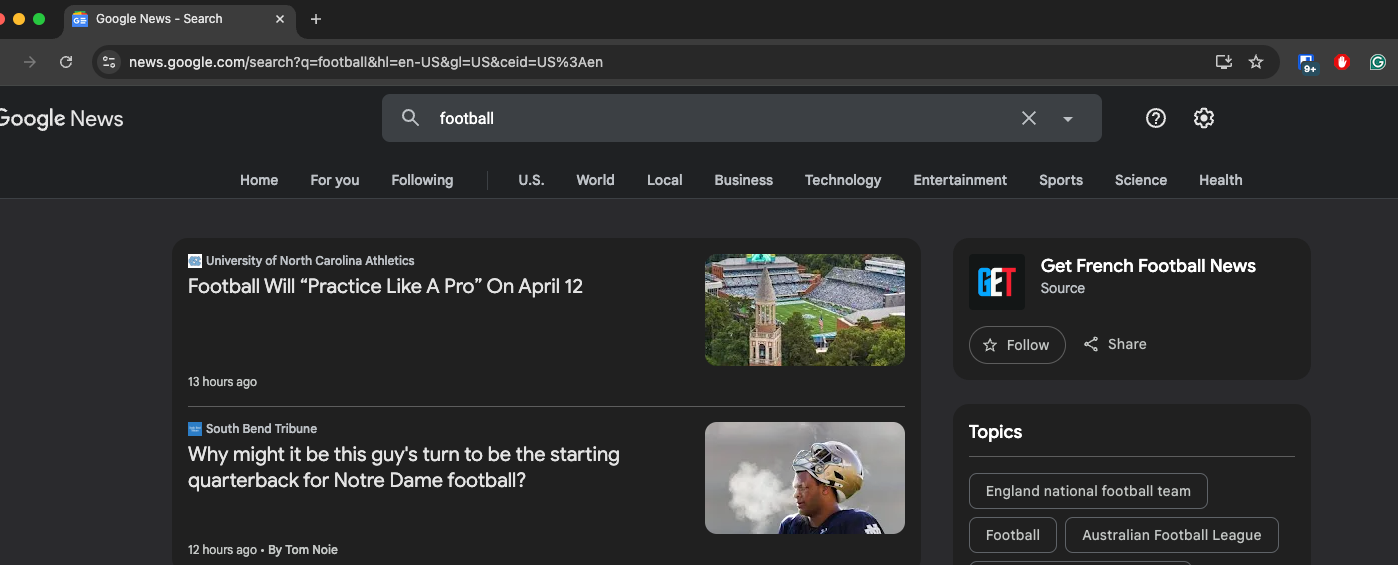
We have a separate API for this: Google News API. Here is what the code looks like in Python.
params = {
"api_key": SERPAPI_API_KEY,
"engine": "google_news",
"q": "football",
}
search = requests.get("https://serpapi.com/search", params=params)
response = search.json()
print(json.dumps(response, indent=2))
- We're using
google_newsas the engine. - We don't need to use the
tbmparameter anymore.
The JSON response will include any information available from the page, including a story block like this:
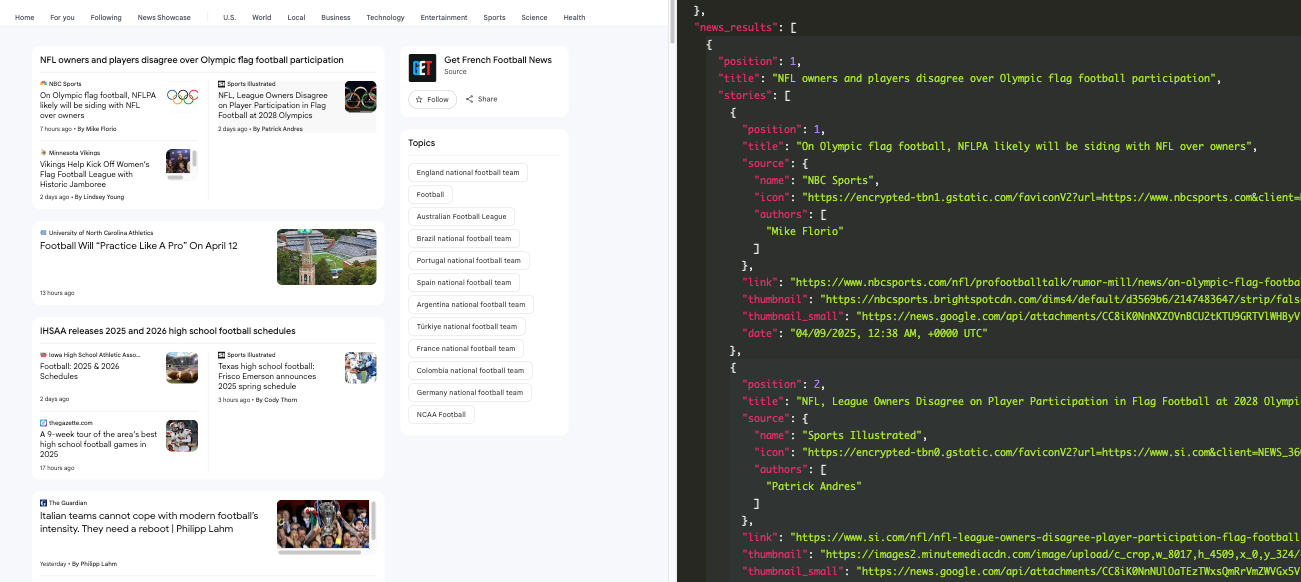
You can remove the parameter if you want to scrape the home page (not a specific query).
params = {
"api_key": SERPAPI_API_KEY,
"engine": "google_news",
}Filter by specific date
To filter news from our Google News API, you can include after:YYYY-MM-DD and before:YYYY-MM-DD on the query.
For example: soccer after:2024-02-01 before:2024-07-31
Here is an example on our playground: https://serpapi.com/playground?engine=google_news&q=soccer+after%3A2024-02-01+before%3A2024-07-31&gl=us&hl=en&sbd=1&newPara=sbd
No-Code solution to scrape Google news
We also provide a no-code tool to scrape the Google news result here: https://nocodeserpapi.com/app/google-news. It allows you to export the results directly into an Excel file.
Here is a video tutorial on scraping news.google.com website using a no-code tool:
If you're looking for a way to connect your search results with Google Spreadsheet, you can use our make.com integration. Here is the basic tutorial for it using a different search engine:
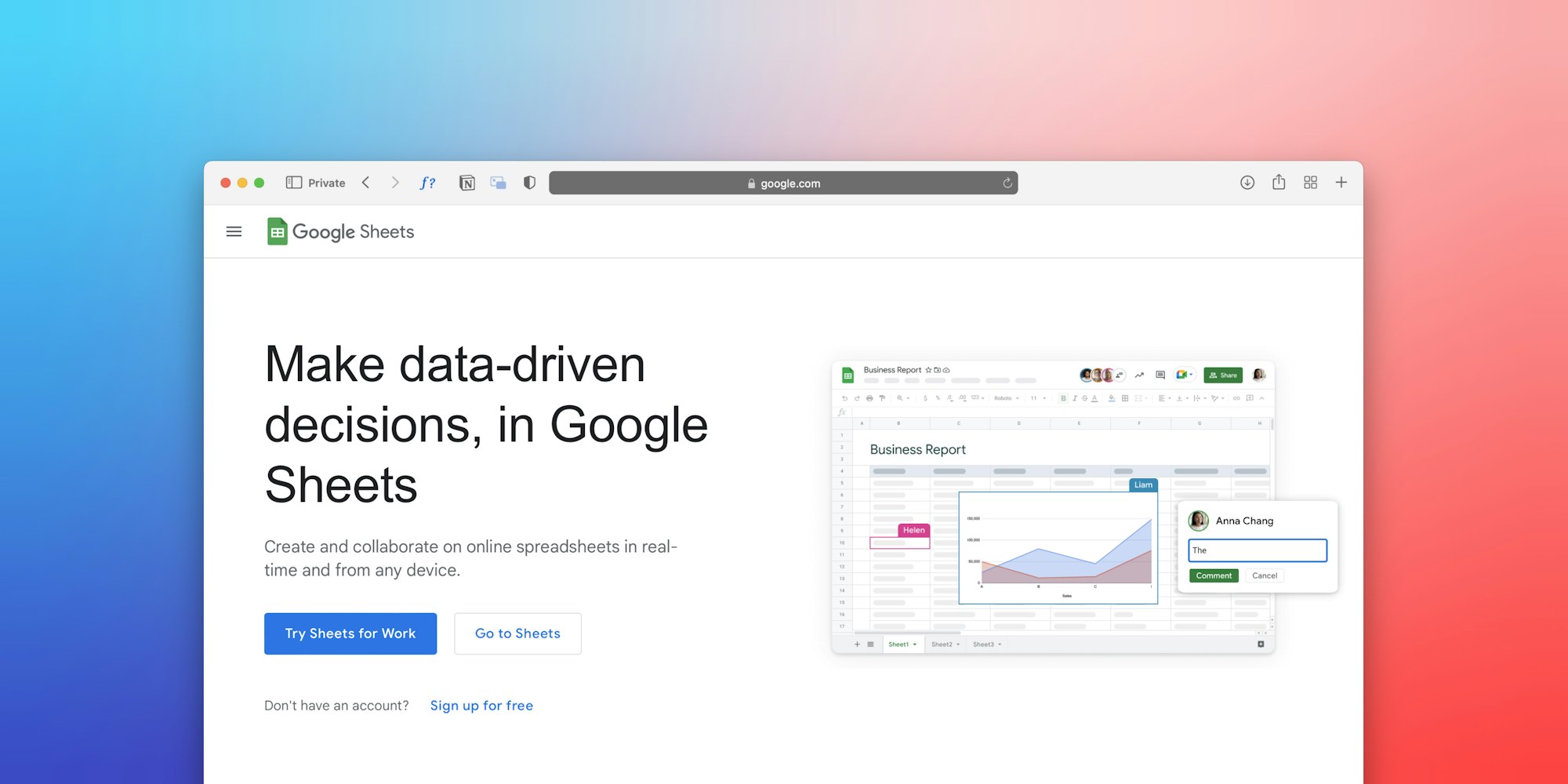
I hope it helps. See you on the next blog post!

